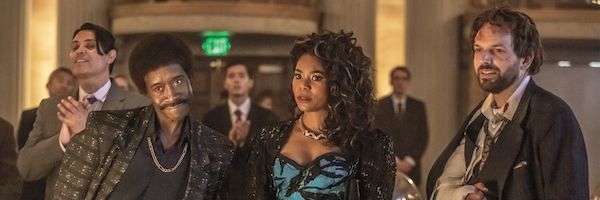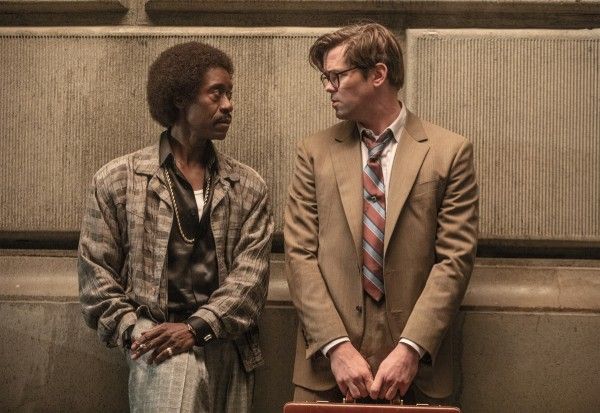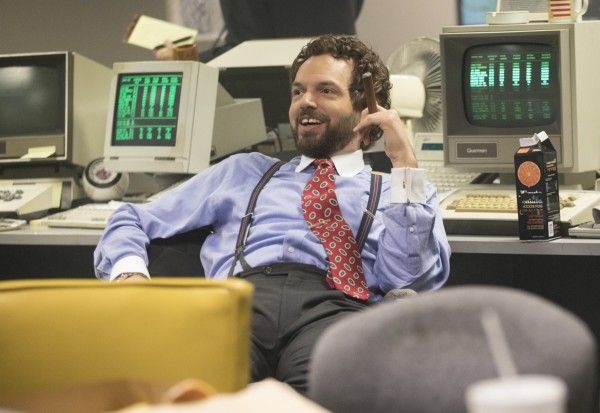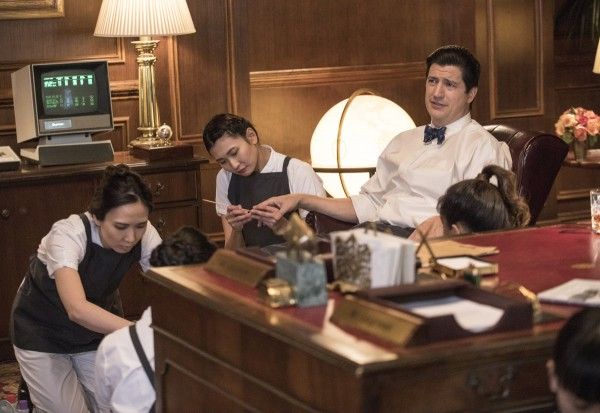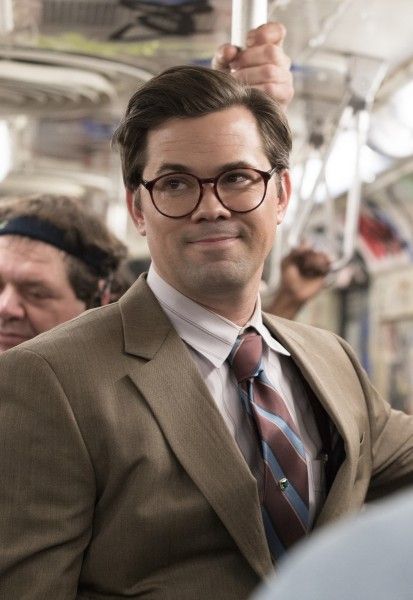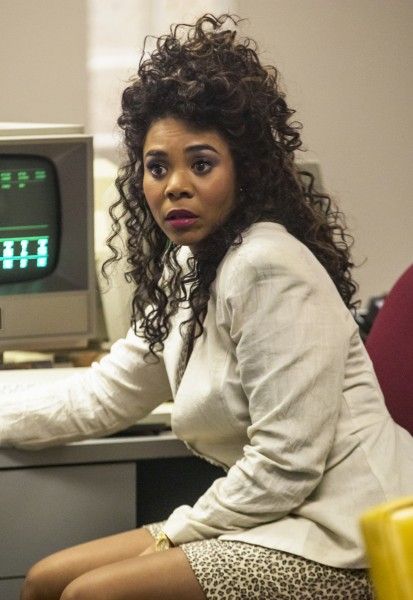In Showtime’s half-hour comedy Black Monday, characters only stop talking to take hits of cocaine. The show could reasonably be called Cocaine, but it is instead titled after the infamously bad stock market crash of October 19, 1987. The series, from creators Jordan Cahan and David Caspe, is a countdown to that fateful day, the cause of which has remained a mystery — until now, and this is the hidden story the show purports to tell. Like Wall Street of the 80s itself, Black Monday is all about greed, presented in massively crass and obnoxious ways. It works hard — too hard, really — to paint its setting as one full of yuppies, schemers, and wannabes.
That scene has been portrayed in many forms, a handful of them still iconic, but what Black Monday does provide is a somewhat different perspective. Maurice “Mo” Monroe (Don Cheadle) runs a Wall Street “chop shop” (as his new employee Blair Pfaff, played by Andrew Rannells calls it), which is mostly held together by longtime collaborator Dawn Towner (Regina Hall). Part of that shift in perspective comes from the fact that the show's leads are black, and though race isn’t a focus in Black Monday, it does occasionally provide a basis for humor. When Mo explains to Dawn how he met Blair, for example, he notes that “There are only so many places for white people go. I could have run into this guy at an apple orchard, or a puppet show, or a place that has a turkey sandwich ‘to die for.’”
But for the most part, Mo is ruthless, loud, and full of bullshit. He’s constantly making deals, reneging on them, and renegotiating the terms on his own terms. He’s not likable or even half as interesting as he thinks he is, although the show seems to disagree. Cheadle occasionally imbues Mo with a hesitation or vulnerability that he needs to not just be a caricature, but the writing often ends up subverting those moments or blowing past them as if they don’t matter. But they do; otherwise, Black Monday is just a hollow satire of Wall Street excess that doesn’t actually have anything to say.
Over the course of the first three episodes available for review, it becomes clear that the series’ most interesting players are Dawn and Blair. Dawn is the real brains of the operation, and a character who deserves to be the focus of the series. Ironically, a screenwriter character who is there to chronicle Mo’s story for a movie ends up being more drawn in by Dawn’s attempts to break into the boys’ club of Wall Street and use her skills and smarts to move up. The same realization will be had by viewers, but unfortunately, it’s dismissed as a joke instead of a sincere suggestion for a course-correction. The issue is exacerbated by positioning Dawn as the “one who got away” for Mo, shoehorning in a Moonlighting-scenario (that the show calls attention to by literally using that very language), and diminishing Dawn’s importance outside of Mo.
Blair, for his part, has a relationship with Mo that is built on a mountain of lies. I won’t spoil their exact connection, but Mo’s manipulations are nearly breathtaking (and unbelievable) in their complexity. But Blair also brings an important perspective the series, and not because he’s portrayed as a hayseed who is easily gobbled up by Wall Street’s corruption. Rannells gives Blair a sincerity that’s coupled with excellent comedic timing. Even with he stands up for himself or confronts those who are trying to take him down, it comes with a shading of naivety and a genuine desire to please that deepens the portrayal. However, it also puts him at an unfortunate juxtaposition with the one-dimensional Mo.
Black Monday’s real selling point should be its comedy (Caspe also created the excellent comedy Happy Endings; Seth Rogen and Evan Goldberg also serve as EPs and directors), but the show doesn’t seem to trust that viewers are understanding its fast-paced jokes and references, so it rushes to contextualize or explain them. There are so many quips and one-liners jammed into the script, not all of them need to land. But the few that do are often undermined by an immediate “see what I did there?” reflection that only makes the glut of jokes seem desperate. (There’s also a surprising amount of incest humor, mostly — sophomorically — directed at the “Leighman” Brothers, played by Ken Marino).
There is a lot about Black Monday that’s desperate; characters are desperate for success, respect, money, revenge, happiness, and change. It makes the show an uneasy watch, as its leads strain so hard to get what they think they need. The series’ cold open begins on the day of the crash, as a body literally crashes into a Lamborghini limousine after leaping from the tower in desperation. It could be Mo, or Blair, or someone we have yet to meet. But the message is clear: all of that posturing and careening and desperation is just sound and fury, signifying nothing.
Rating: ★★
Black Monday premieres Sunday, January 20th on Showtime

